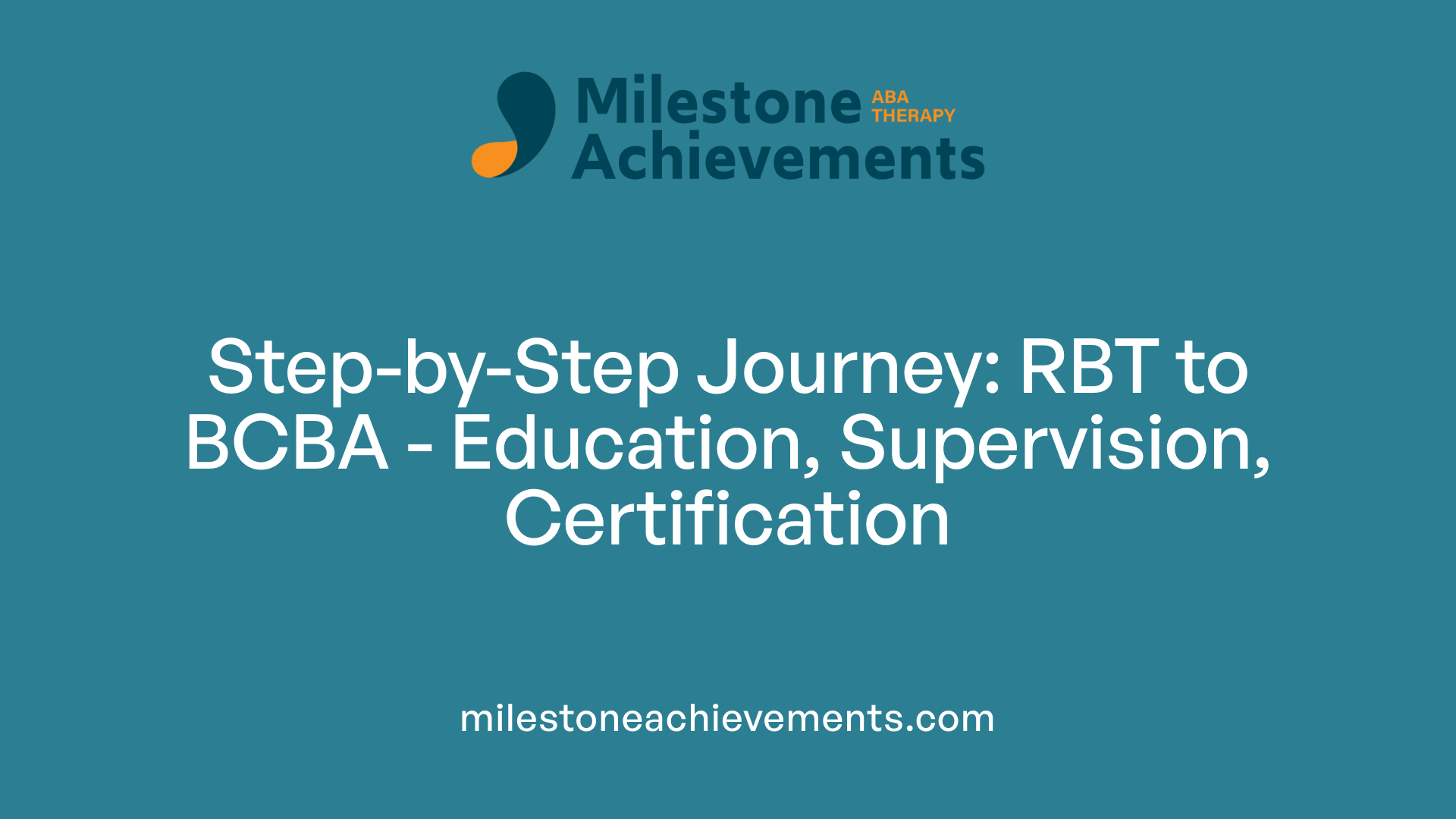
Can an RBT Become a BCBA?
Pathways to Advancement in Applied Behavior Analysis: From RBT to BCBA
Exploring Career Progression in ABA
The field of applied behavior analysis (ABA) offers dynamic career pathways, with many professionals starting as Registered Behavior Technicians (RBTs) and aspiring to become Board Certified Behavior Analysts (BCBAs). This article delves into the steps, requirements, and opportunities for RBTs seeking to elevate their careers in ABA, highlighting the qualifications, certification processes, and roles that define these positions.
Understanding the Roles and Responsibilities of RBTs and BCBAs

What are the roles and duties of RBTs?
Registered Behavior Technicians (RBTs) serve as the frontline team members in applied behavior analysis (ABA) applications. They deliver direct services to clients, following treatment plans developed by BCBAs. Their responsibilities include implementing behavioral interventions, collecting data on client behaviors, and supporting clients in achieving their learning and behavioral goals.
RBTs are responsible for executing specific activities involved in behavioral intervention, such as prompting, reinforcement, and data recording. They work closely under supervision, ensuring that interventions adhere to ethical standards and the prescribed treatment protocols.
While RBTs do not create intervention plans or evaluate client progress independently, their role is critical in ensuring the effectiveness of ABA therapy through precise data collection and consistent implementation.
What are the responsibilities of BCBAs?
Board Certified Behavior Analysts (BCBAs) hold a higher level of responsibility within ABA. They are tasked with designing, overseeing, and assessing behavior intervention strategies. BCBAs conduct initial assessments, develop and modify treatment plans, and analyze ongoing progress through data review.
They supervise RBTs and BCaBAs, providing guidance, training, and oversight to ensure ethical and effective practice. BCBAs also ensure compliance with professional standards, contribute to treatment modifications, and often engage in training and supervision to maintain high-quality services.
In addition to direct client work, BCBAs contribute to the broader field through research, continued education, and advocacy. Their role requires comprehensive understanding of behavior analysis, ethical considerations, and the ability to work independently in various settings.
How do the scopes of practice differ?
The scope of practice significantly varies between RBTs and BCBAs. RBTs focus primarily on the implementation of specific behavioral procedures and data collection.
They are restricted to delivering services under supervision and adherence to established protocols. RBTs can support clients directly and assist in data collection, but they do not conduct assessments or develop plans.
Conversely, BCBAs autonomously conduct assessments, develop individualized treatment plans, and evaluate their effectiveness. They supervise and train RBTs and BCaBAs, ensuring that interventions follow ethical guidelines. BCBAs possess the authority to modify behaviors independently and are responsible for overall client progress.
Table 1 summarizes these differences:
| Aspect | RBTs | BCBAs | Additional Details |
|---|---|---|---|
| Educational Requirement | High school diploma or equivalent | Master’s degree in ABA or related field | BCBAs require graduate education, RBTs do not |
| Certification | RBT credential | BCBA credential | Different certification pathways |
| Main Responsibilities | Implement interventions, data collection | Design plans, supervise staff, assess progress | BCBAs have broader scope |
| Supervision | Works under supervision | Oversees RBTs and BCaBAs | Supervisory role is integral |
| Autonomy | Limited; under supervision | Independent in assessments and planning | Autonomy increases with experience |
Are there other certification roles involved?
Yes, aside from RBTs and BCBAs, the Board Certified Assistant Behavior Analyst (BCaBA) exists as an undergraduate-level certification. BCaBAs work under BCBAs' supervision to provide services and can supervise RBTs. They serve as an intermediate step for those aspiring to become BCBAs, requiring at least a bachelor’s degree and coursework in ABA.
Can RBTs become BCBAs?
Absolutely, many RBTs pursue further education, supervised fieldwork, and certification to become BCBAs. The pathway typically involves gaining practical experience as an RBT, completing graduate coursework (usually a master’s degree), and accumulating supervised hours (generally 2,000 hours). They must also pass the BCBA exam.
This progression from RBT to BCBA is common and supported by structured pathways that allow practitioners to build on their practical experience in ABA. Progressing to the BCBA role enables professionals to take on responsibilities such as developing treatment plans, training staff, and working more independently.
Understanding these distinctions clarifies the professional roadmap within ABA, emphasizing how each role contributes uniquely to client success and service delivery.
Educational and Certification Requirements for BCBA

What are the educational and experiential requirements necessary for certification as a BCBA?
Becoming a Board Certified Behavior Analyst (BCBA) involves a combination of advanced education, practical experience, and successful examination. Candidates must first obtain a graduate degree—either a master's or doctoral—in behavior analysis, psychology, education, or a related field from an accredited program that meets the Behavior Analyst Certification Board (BACB) standards.
This educational background must include specific coursework covering essential topics such as experimental design, assessment methods, and behavior change procedures. Completing these courses ensures that candidates possess a solid foundation in the principles and applications of behavior analysis.
In addition to coursework, applicants are required to accrue supervised fieldwork hours to demonstrate practical competence. Depending on their educational pathway, candidates generally need between 1,000 and 2,000 hours of supervised experience. This fieldwork must be completed under the guidance of a qualified BCBA, providing real-world experience in implementing behavior-analytic interventions.
After fulfilling both the coursework and supervised experience components, candidates are eligible to sit for the BCBA certification exam. This comprehensive assessment evaluates their knowledge as well as their ability to apply behavioral principles ethically and effectively.
Maintaining certification requires ongoing professional development through continuing education and strict adherence to ethical standards set by the BACB.
Are there any specific prerequisites or qualifications needed for certification as a BCBA?
Yes, specific prerequisites are essential to qualify for BCBA certification. All candidates must hold a master’s degree from an accredited or recognized institution, with verified coursework in behavior analysis or a related subject. This coursework must cover core competencies like behavioral assessment, intervention strategies, and ethical considerations.
Supervised fieldwork hours are also mandatory. Typically, candidates need between 1,000 and 1,500 hours of supervised practical experience, gained through direct application of behavior analytic practices under the supervision of a licensed or qualified BCBA.
Passing the BCBA exam is a crucial requirement, testing the candidate’s understanding of behavior analysis principles and their application. While pathways exist for individuals with specialized experience or different academic backgrounds, all applicants must meet these fundamental educational, experiential, and examination criteria to become certified.
Additional Details
| Aspect | Requirement | Additional Information |
|---|---|---|
| Degree Needed | Master’s or Doctoral in relevant field | Must be from an accredited program |
| Coursework | Specific behavior analysis topics | Includes experimental design, assessments, procedures |
| Supervised Fieldwork | 1,000 to 2,000 hours | Complete under qualified supervision |
| Certification Exam | Pass the BCBA exam | Assesses knowledge and application of behavior analysis principles |
| Certification Maintenance | Continuing education and ethics adherence | Ensures ongoing professional competence |
This pathway ensures that BCBAs are well-trained, experienced, and ethically grounded professionals capable of leading behavioral interventions effectively.
The Pathway from RBT to BCBA: Educational, Supervision, and Certification Steps

What are the steps involved in transitioning from RBT to BCBA?
Moving from an RBT (Registered Behavior Technician) to a BCBA (Board Certified Behavior Analyst) involves a structured process. First, the individual must pursue higher education—typically a graduate degree in behavior analysis, psychology, education, or a related field, from an accredited institution recognized by BACB standards.
Next, candidates are required to complete specific coursework focused on behavior analysis principles, including experimental design, assessment methods, and behavior change procedures. This coursework usually totals around 315 hours for BCBA certification.
Simultaneously, aspiring BCBAs accumulate supervised fieldwork hours, which typically range from 1,000 to 2,000 hours, under the supervision of a qualified BCBA. These hours are gained through supervised practical experience in providing ABA services.
Once educational and experiential requirements are met, candidates must register for and pass the BCBA certification exam, which evaluates their knowledge and competency in behavior analysis.
Finally, after successful certification, BCBAs must engage in ongoing continuing education and renewal processes to maintain their credentials.
How long does it typically take to become a BCBA after starting as an RBT?
The timeline from RBT to BCBA varies depending on individual circumstances, educational background, and pace. Typically, the process takes several years, often between 3 to 6 years.
This period includes completing the required master's degree, gaining supervised experience, and preparing for the certification exam. For some, it might be shorter if they already hold a relevant graduate degree, but for others pursuing this path concurrently with degree studies, it can extend beyond six years.
What are the educational and experiential requirements necessary for certification as a BCBA?
To qualify for BCBA certification, candidates must meet advanced educational and practical experience standards.
Educationally, candidates need a graduate degree (master’s or doctorate) in behavior analysis, psychology, education, or another relevant field from an accredited program approved by BACB. The coursework must include core topics like experimental design, assessment techniques, and behavior intervention strategies.
Experientially, candidates are required to complete between 1,000 and 2,000 hours of supervised fieldwork. This work experience must be supervised directly by a qualified BCBA or a supervisor who meets specific criteria, to ensure competency in applying behavior analysis principles.
After fulfilling both the academic and practical requirements, candidates sit for the BCBA exam. Passing the exam, along with maintaining certification through continuing education, allows individuals to practice independently as licensed behavior analysts.
| Aspect | Requirement | Additional Details |
|---|---|---|
| Education | Master’s Degree | In behavior analysis or related field from an accredited program |
| Coursework | 315 hours | Covering ethics, assessment, behavior change, etc. |
| Supervised Fieldwork | 1,000-2,000 hours | Under supervision of a qualified BCBA |
| Certification Exam | Pass | Comprehensive assessment of behavior analysis principles |
This pathway ensures that BCBAs possess both theoretical knowledge and practical competence in behavior analysis, preparing them to deliver high-quality services.
Supervised Fieldwork and Experience for RBTs Aiming for BCBA Certification

How do supervision and fieldwork requirements differ for RBTs and BCBAs?
Supervision and fieldwork requirements for Registered Behavior Technicians (RBTs) and Board Certified Behavior Analysts (BCBAs) vary significantly in scope, responsibilities, and hours mandated by the Behavior Analyst Certification Board (BACB).
RBTs are required to complete a 40-hour training program, pass a competency assessment, and work under supervision to deliver ABA services. Their supervised activities mainly involve direct client interactions, data collection, and implementing behavior plans. The supervision focus for RBTs emphasizes ensuring they perform these tasks correctly and ethically, with supervision sessions primarily involving observation, feedback, and instruction.
In terms of supervised fieldwork hours, RBTs can accrue hours in activities involving direct service delivery, observation, and training. However, activities that are unrestricted or less structured are limited to no more than 40-60% of their fieldwork, depending on specific guidelines. Proper documentation of supervision hours and activities is critical for RBTs, with detailed records maintained to reflect the supervised experiences.
In contrast, BCBAs are responsible for designing and overseeing behavioral treatment plans, conducting evaluations, and supervising RBTs and BCaBAs. They must accumulate many more hours, including supervised practical experience, both restricted and unrestricted activities. BCBA supervision involves a broader scope, including training, assessment, and providing consultation, reflecting their higher responsibilities and independence.
Overall, BCBAs have longer and more comprehensive supervision and fieldwork requirements, which prepare them for autonomous practice, whereas RBT supervision focuses on foundational skills and direct service delivery under close oversight.
Maintaining and Upgrading ABA Certification

How does one maintain and upgrade their certification in behavior analysis?
For behavior analysts holding certifications like BCBA or BCBA-D, staying current and advancing in their careers requires adherence to the guidelines set by the Behavior Analyst Certification Board (BACB). Maintaining certification involves fulfilling ongoing professional development requirements and completing necessary administrative tasks.
To keep their certification active, professionals must earn a designated number of continuing education units (CEUs). Typically, this ranges from 12 to 32 CEUs every two years, with a minimum of some hours dedicated to ethics courses. These CEUs ensure that professionals remain updated with the latest practices and maintain high ethical standards.
An essential part of recertification is documenting supervision activities and professional development activities meticulously. Records should include dates, topics, and verification of activities completed. This documentation supports the renewal application and helps demonstrate compliance with BACB standards.
Certification renewal process
The renewal process is straightforward but requires attention to detail. Professionals must submit a renewal application before the expiration date, along with proof of completed CEUs and supervision hours. The BACB website offers a comprehensive guideline, including deadlines and required documentation.
In addition to CEUs, license renewal might involve background checks, especially in states where licensure is mandatory. Maintaining ethical standards as outlined in the BACB’s Professional and Ethical Compliance Code is mandatory throughout the certification period.
It is advisable for certificants to keep a digital or physical portfolio of all relevant records to facilitate smooth renewal processing and future audits.
Upgrading to BCBA-D
One of the ways professionals can advance their credentials is by upgrading to a BCBA-D (Doctoral) credential. This involves completing a doctoral program in behavior analysis or a related field recognized by the BACB.
The process includes applying through the BACB’s formal procedures, submitting official transcripts, proof of degree completion, and paying any applicable fees. The BCBA-D certification signifies a higher level of expertise, often associated with leadership roles, research, and higher responsibility.
Upgrading also requires meeting ongoing supervision requirements, which may include specific coursework and practical experience components. After meeting all prerequisites, candidates must pass a specialized examination for the BCBA-D.
Continuing education and certification maintenance in ABA
Continuing education is vital in maintaining the quality and efficacy of behavior analytic practice. BACB mandates a mixture of coursework, workshops, and seminars to ensure professionals stay current.
Professionals should regularly check for updates on BACB’s requirements, as policies may change. The BACB’s website offers extensive resources, including a handbook, webinars, and guidelines on recommended courses.
Maintaining a high standard of supervision and ethical compliance throughout the certification cycle helps sustain public trust and ensures effective service delivery.
| Aspect | Requirements | Additional Notes |
|---|---|---|
| CEUs for renewal | 12-32 every 2 years | Minimum hours in ethics |
| Supervision documentation | Maintain detailed records | Essential for renewal applications |
| Renewal deadline | Before expiration date | Applying early prevents lapses |
| Upgrading to BCBA-D | Complete doctoral degree, apply, and pass exam | Demonstrates advanced expertise |
| Continuing education | Industry-relevant courses and training | Essential for practice and renewal |
Professionals in the field are encouraged to actively track their progress, adhere to ethical standards, and plan ahead for certification updates. Staying informed through BACB resources ensures a seamless process for certification maintenance and professional growth.
Supervision Techniques and Ethical Standards in ABA Practice
How do supervision and fieldwork requirements differ for RBTs and BCBAs?
Supervision and fieldwork standards vary significantly between Registered Behavior Technicians (RBTs) and Board Certified Behavior Analysts (BCBAs). RBTs are entry-level professionals who must complete at least 40 hours of training, pass a competency assessment, and work under supervision to provide ABA services. Their supervision largely involves direct client interaction, focusing on implementing behavior plans and collecting data. RBTs can accrue supervised hours through direct service, observation, and assistance with training, but activities are limited to specific types of restricted tasks, usually making up 40-60% of their practice.
In contrast, BCBAs hold advanced credentials requiring graduate education and extensive supervised fieldwork—specifically, 2,000 hours of supervised experience. They are responsible for designing behavior plans, conducting assessments, and supervising RBTs and BCaBAs. The supervision for BCBAs involves overseeing both restricted and unrestricted activities, with a broader scope of responsibilities and more independence in practice. Direct client service constitutes a smaller proportion of a BCBA's overall supervised hours compared to the direct supervision RBTs receive.
Overall, BCBAs have more comprehensive supervision requirements, reflecting their role in independent practice and program oversight, whereas RBT supervision emphasizes skill acquisition and adherence to protocols under close guidance.
What are the supervision training requirements for ABA professionals?
Supervision training requirements across ABA roles emphasize the importance of proper mentorship and ethical practice. All supervisors overseeing RBTs, BCaBAs, or BCBA candidates must complete an 8-hour supervision training curriculum outlined by the BACB. This training covers supervision protocols, ethical standards, and best practices for mentoring supervisees.
Specifically, supervisors responsible for overseeing the supervised fieldwork hours for BCBA certification must undergo this 8-hour training before providing supervision. The curriculum focuses on ensuring supervisors are equipped to deliver high-quality supervision, maintain compliance with ethical standards, and foster professional development. This training ensures supervisors are knowledgeable about documentation procedures, evaluation methods, and the ethical responsibilities involved in overseeing ABA practitioners.
Adherence to supervision standards also includes ongoing professional development and ethical conduct consistent with the BACB’s Ethics Code for Behavior Analysts. This framework promotes professional integrity, guides the supervision process, and supports the growth of competent behavior analysts.
| Supervision Levels | Training Requirements | Focus Areas | Responsible Bodies |
|---|---|---|---|
| RBT supervision | 8-hour supervision training | Ethical conduct, supervision protocols | BACB, Supervisors |
| BCBA/BCaBA supervision | Same 8-hour training + extensive direct supervision | Program design, assessment, supervision | BACB, Supervisors |
| Fieldwork for certification | Supervised hours + training | Application of ABA skills in real settings | BACB, Supervisors |
This structured training ensures all ABA professionals uphold high standards of practice, foster ethical responsibilities, and deliver effective services.
Conclusion: Transitioning from RBT to BCBA — A Path Built on Education, Experience, and Certification
The journey from RBT to BCBA embodies a significant investment in education, supervised practical experience, and commitment to ethical practice. While the pathway requires dedication and time, it offers rewarding opportunities for leadership, specialization, and greater impact within the ABA field. For aspiring professionals, understanding the distinct roles, requirements, and steps involved is essential to making informed career decisions and successfully advancing in this dynamic and growing discipline.
References
- 7 FAQs for RBTs Pursuing BCBA or BCaBA Certification
- How Do I Go From RBT to BCBA? A Guide
- RBT to BCBA: How To Become Certified
- SUPERVISION, ASSESSMENT, TRAINING, AND ...
- ABA Certification Explained: RBT, BCaBA, BCBA, BCBA-D
- Can an RBT Become a BCBA? (The Requirements)
- BCBA vs. BCaBA vs. RBT: Explaining the Differences
- RBT vs. BCBA Career Paths - School of Education
- What's the Difference Between a BCBA and BCaBA?


Partner with us on your child's journey
Milestone Achievements offers evidence-based ABA therapy to help children with autism reach their full potential. Together we’ll set meaningful goals and celebrate progress every step of the way.
Start ABA Services Today


